15 Powerful eCommerce Competitor Analysis Tools to Outsmart Your Rivals
Did you know that there are over 30 million eCommerce websites vying for attention today? That statistic alone shows why keeping tabs on your competitors is essential!
Competitor analysis in eCommerce shows you what’s working for others, where they’re falling short, and what gaps you can take advantage of. From SEO tactics and social content to ad strategies and email campaigns, the right tools can help you break it all down and then do it better.
In this guide, we’ve put together a list of competitor website analysis tools that actually matter in 2025. Whether you’re refining your marketing strategy, exploring new channels, or just want to stop playing catch-up, these tools will help you make wiser moves.
How to Do Competitor Analysis for eCommerce
Competitor analysis isn’t about copying. It’s about spotting gaps, understanding what’s driving growth for others, and using that insight to sharpen your own strategy.
Whether you’re running a growing DTC brand or managing multiple product categories, here’s how to approach it in a way that actually leads to action, not just data overload.
So, let’s reveal how to do competitor analysis in eCommerce.
1. Start by knowing who your real competitors are
You might think you already know who you’re up against. But dig a little deeper. Your direct competitors are the ones selling similar products to the same audience, but your indirect competitors matter just as much. These are brands that solve the same problem or pull from your potential traffic, even if their offering is different.
Search your main keywords, check who’s running ads, and look at who’s dominating social platforms and marketplaces. This will give you a solid list of who’s worth watching.
2. Look at the shopping experience
Visit your competitors’ websites like a customer. How quickly can you find what you’re looking for? Is the design clean or chaotic? Does the product page build trust with strong reviews, clear benefits, or urgency triggers?
Then go through their checkout. Are they offering flexible payment options? Is the process mobile-friendly? It’s all about checking for friction points and opportunities to improve your own site.
3. Dig into their SEO and content strategy
Using the right competitor traffic analysis tool, you can quickly find out which keywords are bringing them traffic, how strong their backlink profile is, and which pages perform best in search.
This tells you a lot about what content they’re prioritising and what topics their audience is interested in. If a competitor’s blog is consistently ranking well, it’s not by accident. See what they’re doing and how you could do it better.
4. Pay close attention to their ads
Most brands don’t spend money on ads that don’t work. That’s why looking at their paid strategy is such a useful shortcut.
Look at the platforms they use, the tone of their copy, the types of creatives they test, and what offers they’re pushing. Are they promoting bundles? Time-limited discounts? Free shipping thresholds? It all signals what’s converting.
5. Don’t ignore what they’re doing on social
Your competitors’ social media presence is a window into their customer engagement. Are they actively posting, or is it an afterthought? Do they use influencers, UGC, or brand-led content? Is their comment section full of praise or complaints?
Also note which platforms they’re investing in. A strong presence on TikTok or Pinterest might mean they’re reaching audiences you haven’t tapped yet.
6. Pricing, positioning, and promotions
This part often gets overlooked, but it’s where real buying decisions happen. Are your competitors undercutting your pricing? Are they offering bundles, perks, or loyalty programmes that you’re not?
Also, consider their positioning. Are they going premium while you’re mid-range? Do they speak to a niche audience more directly than you do? That gap in messaging can be just as impactful as price.
7. Finally, check what customers are actually saying
Tools can show you numbers, but real customer feedback shows you what matters. Check review platforms, Reddit, and even comment sections on social media. What are customers complaining about? What keeps coming up as a reason people love (or leave) the brand? That insight is gold.
15 Must-Have eCommerce Competitor Analysis Tools You Need in 2025
Now that you know why it is important to use an ecommerce competitor analysis tool, we are going to reveal 15 of the best below:
1: SpyFu
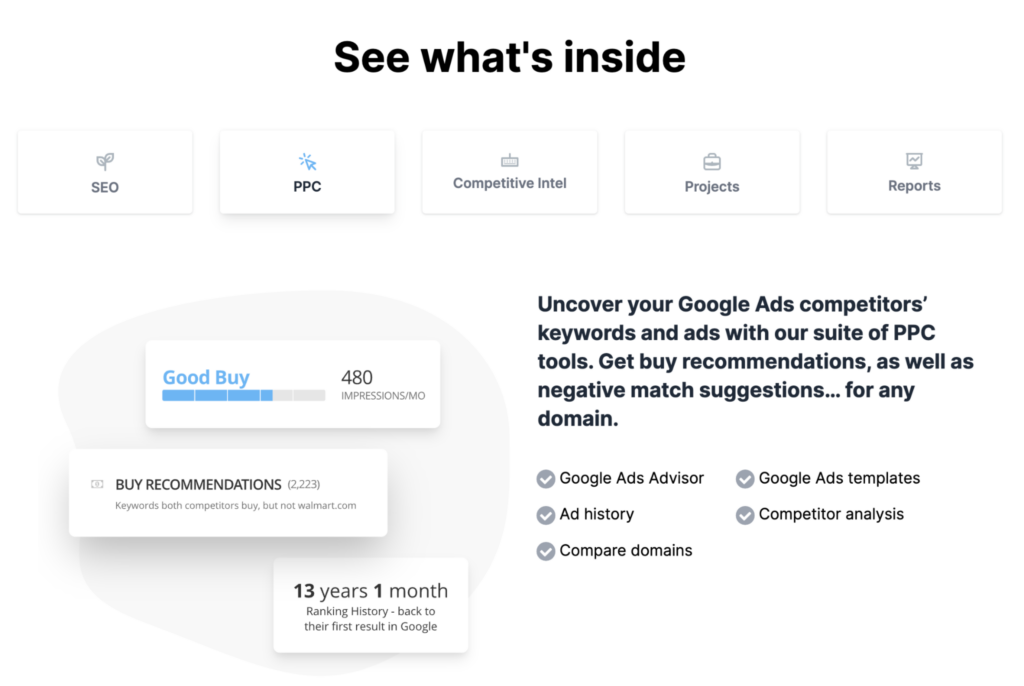
If you want to understand how your competitors are getting found on Google, both through organic search and paid ads, SpyFu is a competitors website analysis tool worth having on your radar.
It gives you access to the keywords your competitors are ranking for, the ads they’re running, and even how much they might be spending. You can plug in any domain and instantly see their SEO and Google Ads history, right down to the actual ad copy they’ve used.
What sets SpyFu apart is how much ground it covers with a single search. You can:
- See a competitor’s top-performing organic and paid keywords
- Track keyword overlap so you can spot missed opportunities
- Browse real ad copy and spend estimates for Google Ads
- View backlink profiles to see how they’re building authority
- Compare multiple domains side-by-side to benchmark performance
This helps you make smarter, more strategic decisions about what to target, what content to prioritise, and where to spend.
Pros:
- You get to see what’s actually working – From keywords to ad copy, it’s all there
- No annoying limits – Search as many competitors as you want
- Shows trends over time – Great for spotting what’s consistently driving results
- Doesn’t break the bank – Especially useful if you’re not working with a huge budget
Cons:
- Only covers Google – So if your competitors are big on Meta or TikTok, you’ll need another tool
- Interface could use a refresh – It’s functional, but not the smoothest to use
- Not built for deep SEO fixes – You won’t get site audits or crawling tools here
2. Brand24
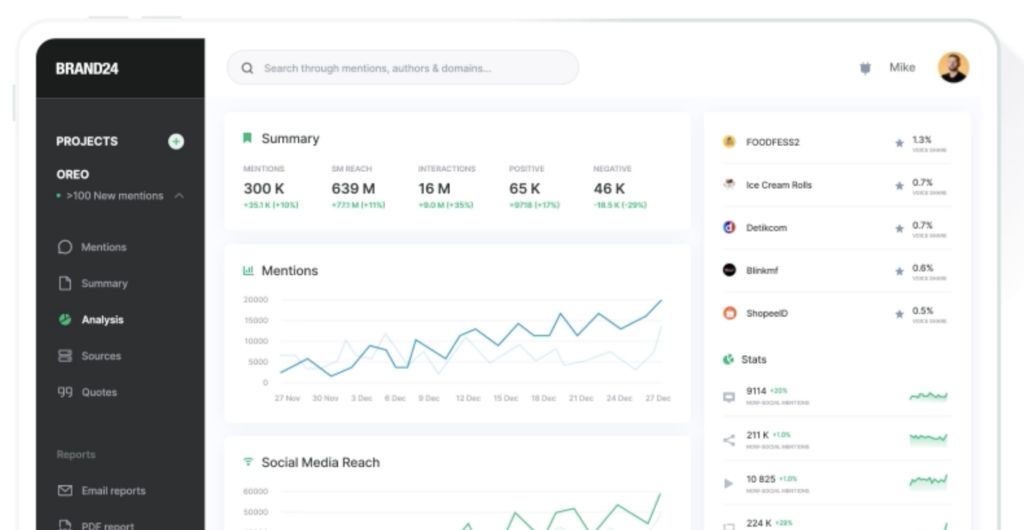
If you want to know what people are saying about your competitors and where they’re saying it, Brand24 is one of the best tools for real-time social listening.
You can track mentions across social media, news sites, blogs, forums, podcasts, and more. It’s especially helpful when you’re trying to understand how a competitor is being talked about online, how often they’re being mentioned, and whether the sentiment is mostly positive or negative.
For eCommerce brands, this helps you uncover opportunities. Is a competitor getting slammed for poor delivery times? Are people raving about a new product launch? That’s information you can act on fast.
You can also use Brand24 to monitor your own brand and benchmark it directly against others.
Here are the key features:
- Track competitor brand mentions in real time
- Analyse sentiment – See whether people are loving or criticising a brand
- Spot trending content and hashtags tied to your niche
- Identify influencers already engaging with competitor content
- Compare multiple brands side by side for volume, reach, and engagement
This kind of insight is especially valuable if you’re active on social platforms or want to keep up with fast-moving conversations in your space.
Pros:
- Real-time tracking – Stay on top of conversations as they happen
- Sentiment analysis is genuinely useful – See public perception at a glance
- Covers a wide range of sources – Not just social media
- Great for spotting trends early – Helps you move before your competitors do
Cons:
- It can get noisy – You may need to fine-tune your filters for relevance
- Not a scheduling or posting tool – It’s purely for monitoring and analysis
- Free plan is limited – You’ll need a paid plan for full functionality
3. Semrush
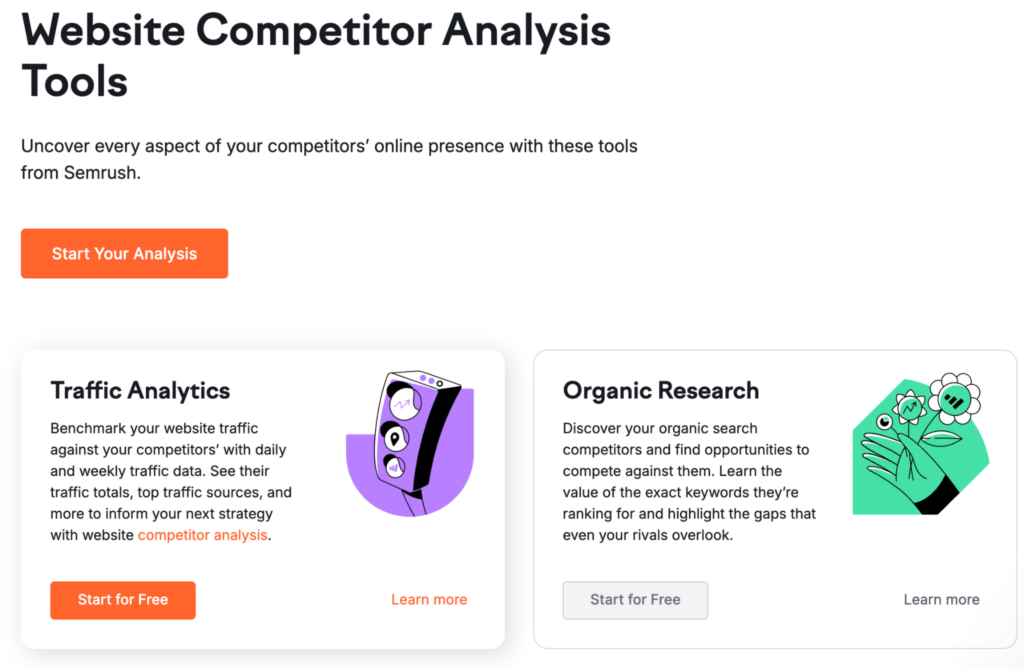
If you’re looking for an all-in-one digital marketing toolkit, Semrush is one of the most comprehensive platforms out there, and a favourite for competitor analysis in SEO, paid media, and content strategy.
What makes Semrush so powerful is how deep it goes. You can plug in a competitor’s domain and get a full picture of their online presence, such as traffic sources, keywords, backlinks, display ads, shopping ads, and more. It’s especially useful for spotting what’s driving their visibility and how you can tap into similar strategies.
You don’t need to be an SEO pro to get value from it either. The platform is built to make comparisons easy, so you can quickly figure out where you’re ahead, behind, or missing something entirely.
Here are the key features:
- See your competitors’ top organic and paid keywords
- Check traffic estimates by channel – Organic, direct, social, referral, and ads
- Analyse backlink profiles, including referring domains and anchor text
- Track content performance – Find out what’s ranking and earning traffic
- Monitor SERP features – See if they’re winning featured snippets or video spots
- Compare up to five competitors at once for a complete market view
This tool is especially handy if you want more than just keywords. It gives you a true overview of what’s working across every channel your competitors use to grow.
Pros:
- Incredibly detailed data – Great for SEO, PPC, content, and beyond
- Traffic insights are solid – They help you understand where competitors are getting visibility
- Competitive gap tools are smart – Easy to see what you’re missing
- Works well for benchmarking multiple brands at once
Cons:
- It’s not cheap – Full features require a higher-tier plan
- Some tools feel overwhelming at first – There’s a learning curve
- Limited on social data – You’ll need another tool for deep social competitor insights
4. BuzzSumo
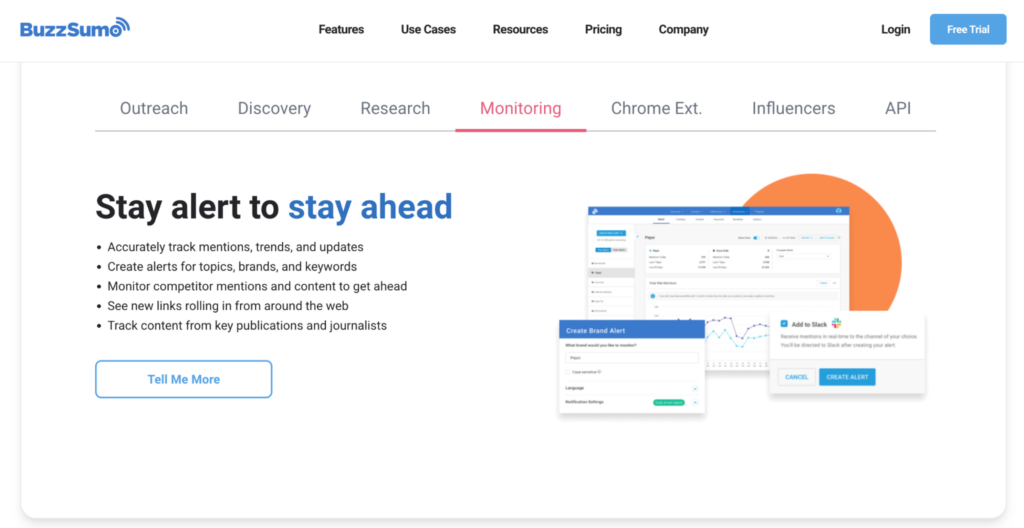
If content plays a big role in your eCommerce strategy, be it blogs, videos, social posts, or even influencer campaigns, BuzzSumo is a go-to tool for tracking what’s actually performing across the web.
This eCommerce competitor analysis tool shows you which content is getting the most shares, backlinks, and engagement in your niche. Just enter a keyword or competitor domain, and you’ll see their top-performing content by format, platform, and time period.
You can also track trends, monitor mentions, and identify which influencers are driving traction for your competitors.
It’s especially useful when you want to create content that actually competes, not just fills space.
Here are the key features:
- Discover a competitor’s most shared content
- Track backlinks and social shares across different formats
- Find trending topics based on real-time data
- Monitor brand mentions and keywords to stay informed
- Identify influencers who are amplifying competitor content
Whether you’re planning a blog series, working on SEO-driven content, or looking to partner with creators, BuzzSumo gives you the kind of data that makes content decisions easier.
Pros:
- Quickly shows what’s working – No guesswork in your content strategy
- Strong influencer discovery tools – Great for finding who’s boosting your competitors
- Real-time trend tracking – Helps you move fast on emerging topics
- Easy to use – Clean interface, no SEO expertise required
Cons:
- Focuses on content only – Not useful for technical SEO or paid media
- Free plan is limited – You’ll need to upgrade to access full features
- Social share data isn’t platform-deep – Good for headlines and performance, but not audience insights
5. MozBar
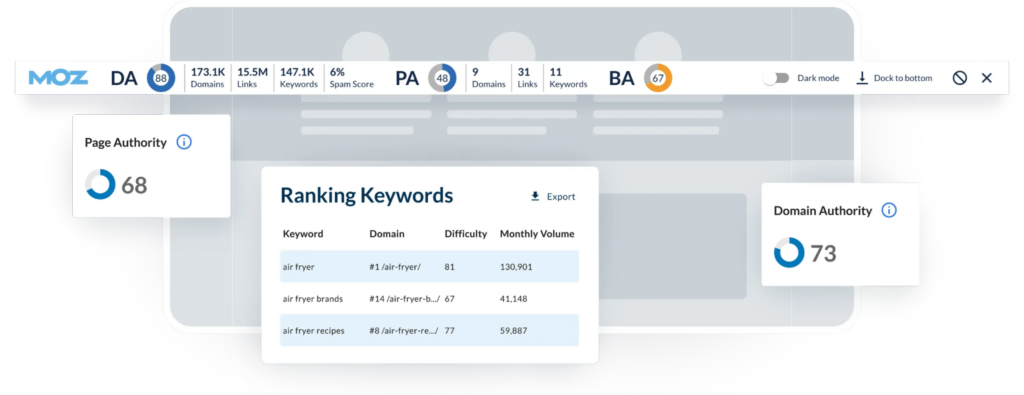
MozBar is a free Chrome extension that gives you instant SEO insights as you browse the web, making it perfect for quick competitor checks without needing to run a full report.
When you’re on a competitor’s site or looking through search results, MozBar shows you their Domain Authority (DA) and Page Authority (PA), two metrics that indicate how likely a page or domain is to rank in search. You can also see link data, on-page elements, and keyword highlighting at a glance.
It’s not a deep-dive tool, but it’s great for getting a feel for how strong your competitors are in search and which pages might be worth looking at more closely.
Here are the key features:
- Check Domain Authority and Page Authority instantly
- View metadata, headings, and on-page elements for any page
- Highlight keywords on a page for quick keyword context
- Explore link types – See which links are internal, external, follow or nofollow
It’s a useful browser-side shortcut when you’re doing quick research or building an initial list of competitor content to analyse further.
Pros:
- Super convenient – Just install and browse
- Helpful for quick SEO comparisons, especially when vetting competitors in the SERPs
- Free to use – Some features available even without a Moz account
- No need to open a dashboard – Everything is right in your browser
Cons:
- Not for deep eCommerce competitors analysis – Limited to surface-level metrics
- Metrics like DA/PA are proprietary – Useful, but not the whole SEO picture
- Link data is basic – You’ll want a more advanced tool for serious backlink research
6. Ahrefs
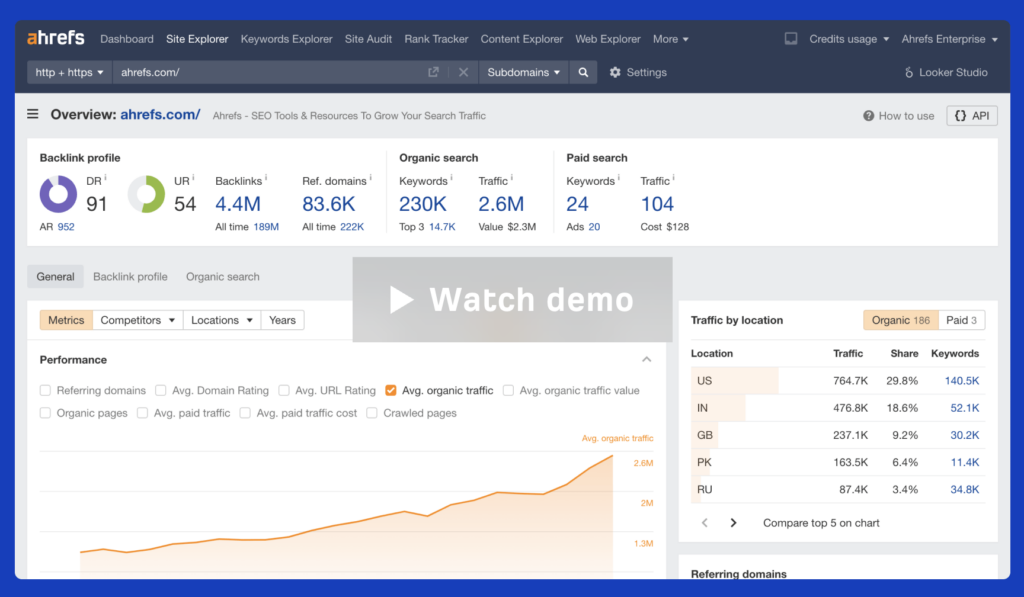
If you’re serious about understanding how your competitors are driving traffic through organic search, Ahrefs is one of the most impressive eCommerce market research tools.
It gives you detailed insights into their top-performing content, ranking keywords, and backlink strategies, all in one place. What sets Ahrefs apart is the depth of its data. You’re not just seeing what your competitors are doing today; you’re also able to track how their SEO performance has changed over time.
From blogs and product pages to backlinks and domain authority, Ahrefs helps you figure out why a competitor is outranking you and what you can do about it.
Here are the key features:
- See which keywords competitors rank for, along with estimated traffic
- Track backlink profiles – Who’s linking to them, and why it matters
- Analyse top pages – Find out which URLs bring in the most traffic
- Run content gap analysis – Discover keywords they rank for that you don’t
- Track ranking positions over time for any domain or keyword
- Get alerts when a competitor gains or loses links
Ahrefs is especially useful when content, SEO, and link building are core to your growth strategy. It helps you go way beyond surface-level stats to really understand what’s working for other brands in your space.
Pros:
- Massive backlink database – One of the best for link analysis
- Strong keyword research tools – Covers multiple search engines
- Content gap feature is gold – Quickly spot areas to improve or expand
- Accurate traffic estimates – Great for judging real impact
Cons:
- Pricey for smaller brands – Not the most budget-friendly option
- No social or paid media data – It’s SEO-focused only
- Takes a bit of learning – Powerful, but not beginner-level
7. SimilarWeb
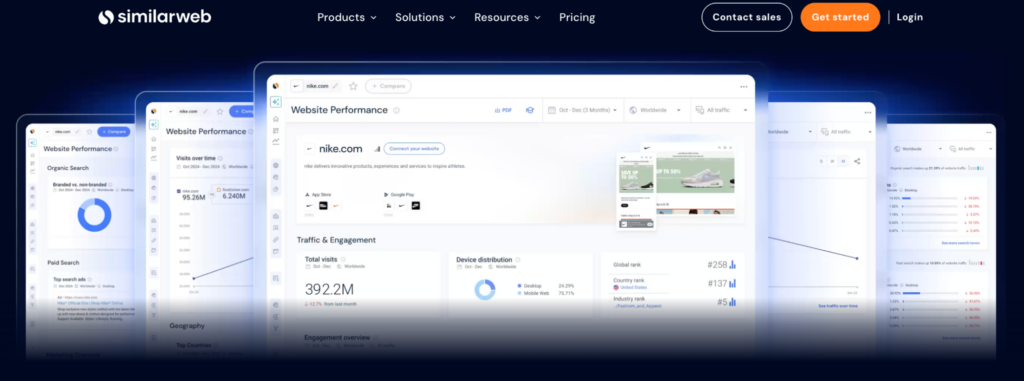
Do you want a big-picture view of how your competitors are getting traffic and where it’s coming from? SimilarWeb is built for that. It shows you estimated traffic volumes across key channels, such as organic search, paid search, referrals, social, display ads, and even direct traffic.
What makes SimilarWeb stand out is how broad its reach is. You’re not just looking at one marketing channel; you’re seeing the full digital footprint of any site, including user engagement data like bounce rate, average visit time, and pages per visit.
This kind of insight helps you answer questions like:
- Where are our competitors getting most of their traffic?
- Are they investing more in paid search, SEO, or partnerships?
- Which sites are sending them the most referral traffic?
- How are they performing in terms of user engagement?
You can also compare multiple competitors side by side and track how their traffic mix changes over time.
Here are the key features:
- Break down traffic sources by percentage and channel
- Identify top referring websites – Spot potential partnership or ad opportunities
- Analyse audience engagement – See how sticky a competitor’s site actually is
- Benchmark against industry averages
- Track changes over time – Spot seasonal shifts or campaign impacts
Pros:
- All-channel traffic view – Helps you see the full strategy, not just SEO or ads
- Great for benchmarking – Stack yourself up against direct and indirect competitors
- Strong referral data – Can reveal affiliate, PR, or partnership wins
- User-friendly dashboards – Easy to visualise insights
Cons:
- Traffic data is estimated – Useful, but not always 100% precise
- Limited keyword-level detail – It’s not a replacement for SEO tools
- Free version is restricted – You’ll need a paid plan to unlock full competitor profiles
8. Feedly
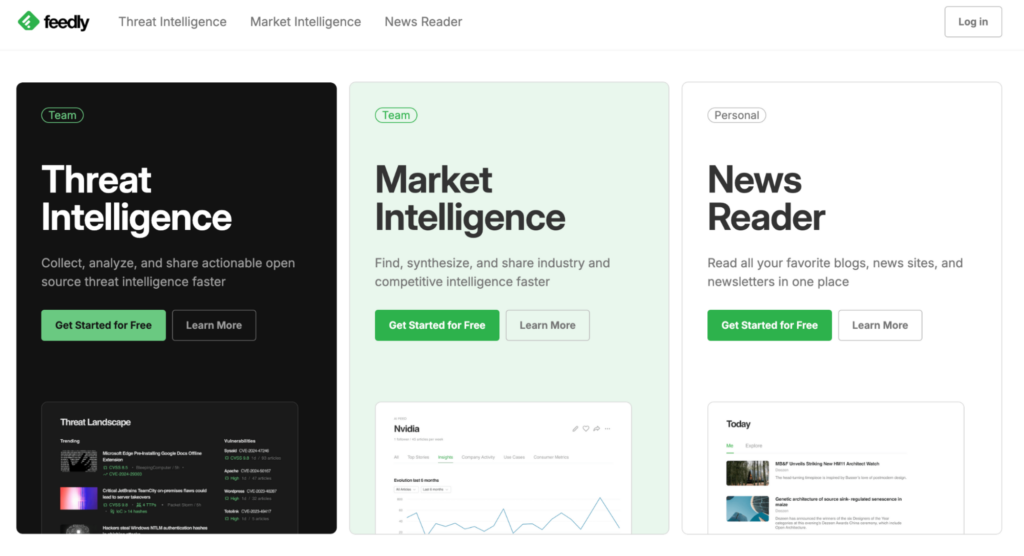
While it’s not a competitor analysis online tool in the traditional sense, Feedly is a clever way to keep an eye on your competitors’ content, without having to visit their websites or social profiles every day.
Think of it as a custom newsfeed. You can follow your competitors’ blogs, YouTube channels, newsletters, and even Twitter accounts in one place. That means when they publish something new, you’ll see it instantly, along with updates from the rest of your industry, trends, and topic-based sources you care about.
Here are the key features:
- Track competitor blog posts and content updates in real time
- Create feeds based on keywords, brands, or product categories
- Follow thought leaders and industry voices to stay ahead of trends
- Group competitors into custom boards for easy side-by-side monitoring
- Use AI-powered summaries to quickly digest long content (great for time-saving)
Feedly is especially helpful for those seeking digital competitive analysis tools who want to spot content gaps, monitor how competitors are positioning themselves, or simply stay aware of what’s being talked about in your space, without chasing it all down manually.
Pros:
- Keeps everything in one place – No more hopping between websites
- Customisable and easy to use – Set up feeds that match your focus
- Great for monitoring content trends – Spot what competitors are writing about, and when
- Time-saving – Helpful summaries mean you don’t need to read every word
Cons:
- Not a full competitor checker tool – Doesn’t give analytics or performance data
- No SEO or traffic insights – You’ll need other eCommerce tools for that
- It can feel overwhelming if you add too many sources at once
9. Milled

Do you want to know how your competitors are using email to drive traffic, promote sales, or launch new products, without signing up for their mailing lists? Milled gives you a full window into their email strategy.
It’s essentially a massive searchable archive of real marketing emails from eCommerce brands across the world. You can search by brand name, keyword, product type, or industry and instantly see how brands are structuring their emails. We’re talking subject lines, visuals, offers, timing, frequency, and more.
Here’s how it helps:
- Browse competitors’ real email campaigns without subscribing to their lists
- Search by keyword, product, or topic to spot campaign ideas and seasonal trends
- Analyse email design, layout, tone, and offers to see what others are doing well
- Track frequency and timing – See how often brands send and when
- Create saved lists of brands or categories to monitor over time
Whether you’re planning a new campaign or refining your automations, Milled makes it easy to benchmark your approach against what’s already being sent in your space.
Pros:
- Super easy to use – Just search and browse email campaigns instantly
- Inspires ideas fast – Great for promo timing, design cues, and subject lines
- No inbox clutter – You get the emails without subscribing
- Free to access – No sign-up required for basic browsing
Cons:
- No performance data – You’ll see the emails, but not open/click rates
- Limited custom tracking – Can’t set alerts or get competitor-specific analytics
- Mostly manual analysis – You still need to draw your own conclusions
10. SimilarMail
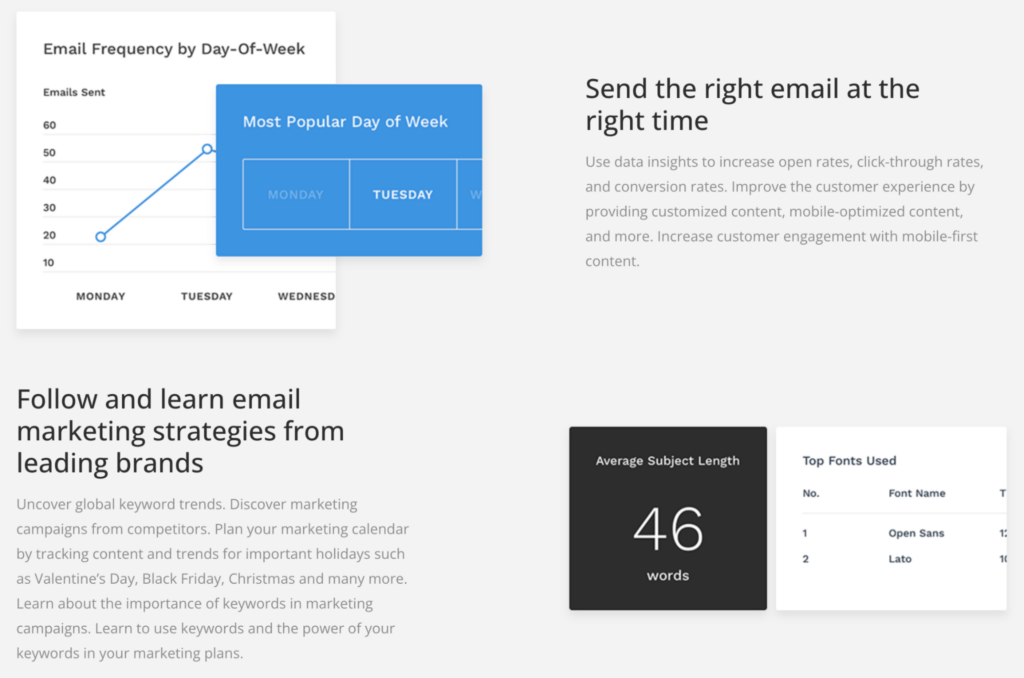
If email marketing is a key part of your eCommerce strategy, and let’s be honest, it should be, SimilarMail gives you a data-driven way to see how your competitors are using email to engage, convert, and retain their customers.
Unlike visual inspiration tools, SimilarMail focuses on the strategy behind the campaigns. You can dig into things like send frequency, subject line trends, inbox placement, and even timing, helping you figure out what’s working for others and how your approach stacks up.
Here are the key features:
- Track how often competitors send emails, and what days they send
- Analyse subject lines – See which tones, keywords, and styles they use
- Check inbox placement – Find out if competitor emails land in Promotions, Spam, or the main inbox
- Compare multiple brands at once – Spot patterns in cadence and structure
- Review call-to-action formats and layouts – Get ideas for improving your own
This kind of insight is ideal when you’re aiming to refine your email strategy with real-world competitive data, not just pretty examples.
Pros:
- You get actual strategy insights – Not just a gallery of nice-looking emails
- Inbox placement tracking is rare – Super helpful for improving your own deliverability
- Multi-brand comparisons – Great for benchmarking across your niche
- Performance-based – Helps you make smarter decisions around send timing and structure
Cons:
- Not widely known yet – Smaller tool with limited documentation
- Some features locked behind a paywall – Free version has limits
- Interface is functional, not flashy – But the data makes up for it
11. Google Keyword Planner

While it’s built primarily for advertisers, Google Keyword Planner is still a valuable tool for understanding what your competitors might be targeting and where the keyword opportunities are in your niche.
It’s especially useful for uncovering search demand, identifying high-volume keywords, and exploring keyword variations tied to specific products or services. And since it pulls data straight from Google, you’re getting a direct view of what people are actively searching for, which makes it a solid starting point for both SEO and paid campaigns.
Here’s how it helps:
- Find keyword ideas related to your product or competitor’s site
- See average monthly search volumes and competition levels
- Explore suggested bid ranges – Helpful if you’re also running Google Ads
- Filter results by location, language, or device
- Plug in competitor URLs to generate keyword themes they’re likely targeting
While it won’t show you exactly which keywords a competitor is bidding on, it does help you spot overlaps and build smarter campaigns that respond to real demand.
Pros:
- Direct from Google – Reliable, up-to-date keyword data
- Great for building SEO or PPC foundations – Useful across strategies
- Free to use – No cost if you have a Google Ads account
- Keyword filters help focus your research – Sort by region, device, and more
Cons:
- Not designed for competitor tracking – You’ll need other tools to fill in the gaps
- No content or backlink insights – Purely keyword focused
- Search volume ranges can be vague, especially without active campaigns
12. SE Ranking
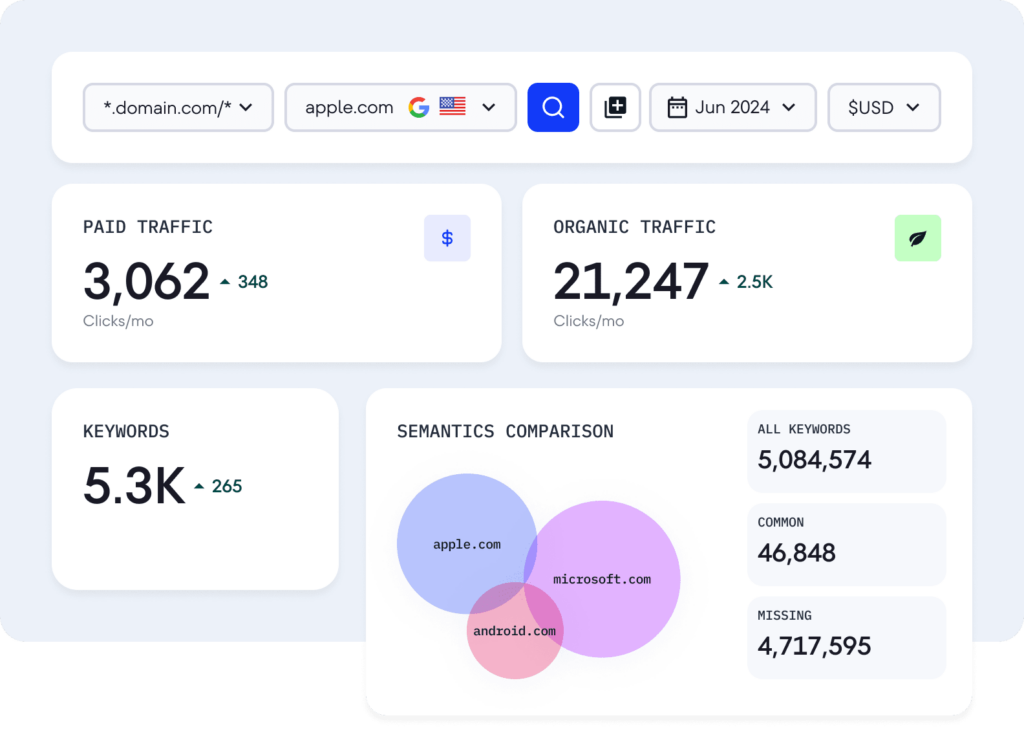
If you’re after a tool that gives you a clear view of how your SEO stacks up against competitors, without overwhelming you, SE Ranking is a solid choice.
It brings together multiple SEO tools in one dashboard, making it easy to track rankings, audit your site, compare keyword performance, and monitor what other brands in your space are doing. For eCommerce, it’s especially helpful when you want to keep an eye on product-related keywords, content visibility, and backlink gaps.
Here’s Here are the key features:
- Track your keyword rankings alongside competitors
- Audit your own site for technical and on-page SEO issues
- Spy on competitor keywords – See what they rank for and where
- Compare backlink profiles – Find gaps and link opportunities
- Set up automated reports to stay on top of changes over time
It’s a flexible platform that’s easy to use, whether you’re running a small store or managing a multi-category eCommerce site.
Pros:
- Well-rounded feature set – Covers SEO, competitive research, and audits
- Clean and intuitive interface – Easy to get up and running
- Good for ongoing tracking – Set alerts for ranking or backlink changes
- Affordable compared to big platforms – Great value for what you get
Cons:
- Keyword volume estimates can lag behind bigger tools like Ahrefs
- Limited third-party integrations – Fewer add-ons if you’re using lots of tools
- Not as strong in content research – Better for ranking and backlink insights
13. BuiltWith
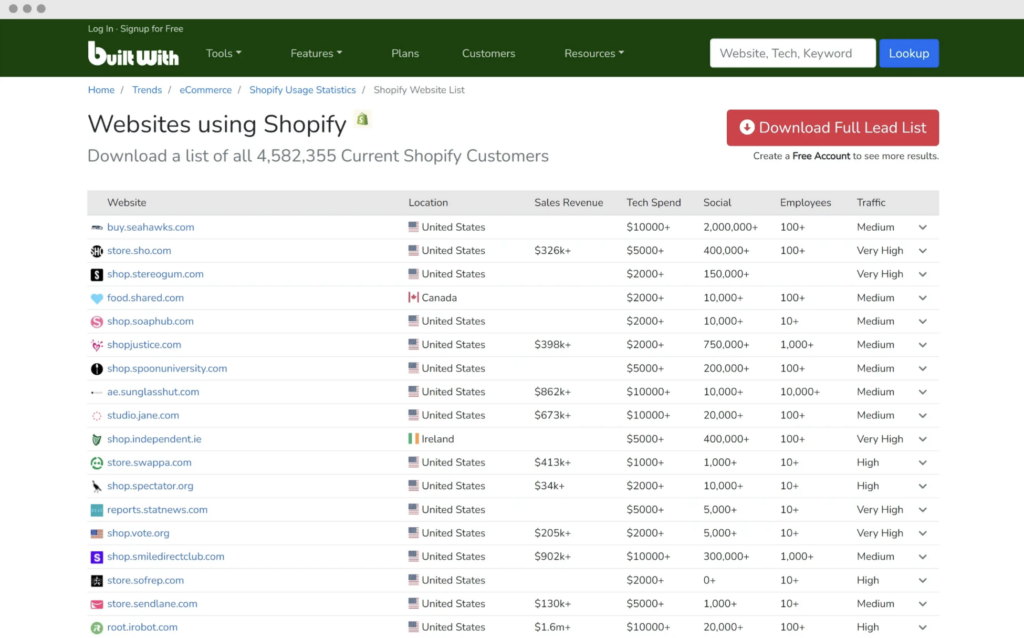
Have you ever wondered what platform your competitors are using? Whether they’re running on Shopify, Magento, or something custom? And, which tools they’ve added for reviews, analytics, A/B testing, or live chat?
BuiltWith gives you exactly that: a full breakdown of the technologies used on any website.
It’s a helpful tool when you want to see:
- What eCommerce platform a competitor is using
- Which payment providers and analytics tools are installed
- Any marketing, CRM, or A/B testing tools they rely on
- Third-party integrations like email platforms, chat widgets, or heatmaps
- Historical changes in tech stack (track what tools were added or removed)
This type of insight is great if you’re planning to upgrade your own stack or just want to know how others are powering their customer experience.
Pros:
- Instant tech stack visibility – Find out what’s running under the hood
- Covers thousands of tools – From backend to frontend
- Great for identifying trends – Spot what tools are gaining popularity
- Useful for lead generation too – Filter sites using specific tech
Cons:
- Purely tech-focused – No marketing or content insights
- The interface is a bit dated – Functional, but not slick
- Deeper reporting requires a paid plan – The free version shows limited data
14. Wappalyzer

If you’re browsing a competitor’s site and want a quick look at what tools they’re using, without running a full report, Wappalyzer is the tool for it.
It works as a browser extension and instantly detects the technologies a site is using. Whether it’s their eCommerce platform, analytics tools, email software, or even heatmaps and A/B testing platforms, Wappalyzer pulls it up in seconds right in your browser window.
Here are the key features:
- See platform and CMS details – Shopify, Magento, WooCommerce, etc.
- Detect third-party tools – Live chat, analytics, personalisation, and more
- Get instant insights as you browse – No need to run a full search
- Track tool usage over time if you’re logged in with a Wappalyzer account
- Use the API (if needed) for deeper integration or automation
It’s ideal for quick checks during research or when you’re comparing multiple competitors in one go.
Pros:
- Super fast and easy to use – Just click while browsing
- No need for full dashboards or exports
- Surprisingly detailed – Picks up on a wide range of technologies
- Free to start – Great functionality without needing to upgrade
Cons:
- Not as deep as BuiltWith – You won’t get full history or granular data
- Occasionally misses newer or less common tools
- Best used for spot-checking, not ongoing tracking
15. SparkToro
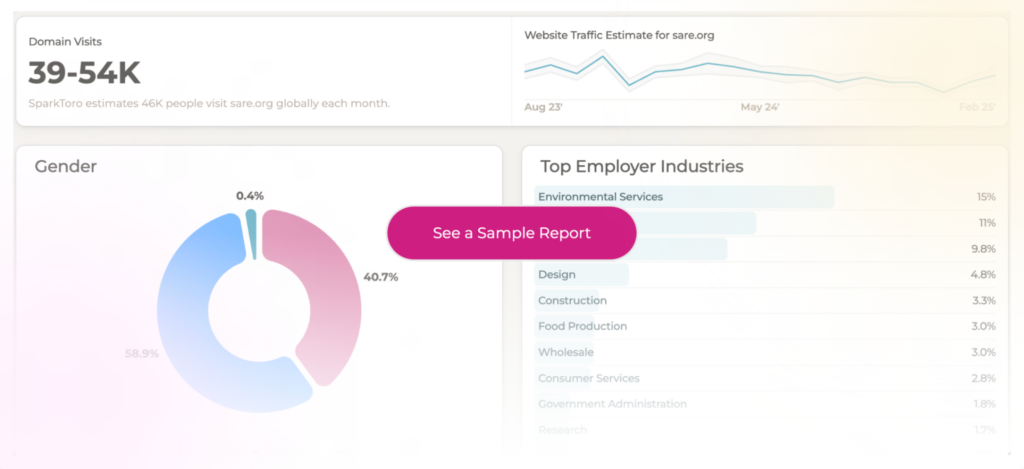
If you want to go beyond surface-level competitor data and really understand who your audience (and your competitors’ audience) is paying attention to, SparkToro is the tool for that.
It helps you discover what your ideal customers or your competitors’ followers are reading, watching, listening to, and following online. That means you’re not just looking at keywords and content, but where influence is actually happening.
Here are the key features:
- See which websites, podcasts, YouTube channels, and social accounts a target audience follows
- Search by keyword, hashtag, or audience trait (like job title or interest)
- Compare audiences between competitors to spot gaps or overlaps
- Identify niche influencers and content sources your competitors rely on
- Build smarter outreach or ad strategies based on where attention already exists
This kind of insight is powerful when you want to build brand awareness, reach, or partnerships in the same spaces as your competitors or ideally, before they get there.
Pros:
- Goes beyond keywords – Focuses on audience behaviour, not just traffic
- Great for influencer and content strategy – Helps you find who really matters
- Simple, clear interface – No deep learning curve
- Useful for audience comparison – See how your audience overlaps with competitors
Cons:
- Not built for SEO or paid ads – This is audience research, not performance tracking
- Limited on real-time data – More about patterns than live trends
- Works best when you know your audience profile well – Needs thoughtful input
Compare the Tools at a Glance
| Tool Name | Best For | Key Features | Approx Pricing (GBP) | Free Plan? |
| SpyFu | PPC and SEO competitor insights on Google | Paid/organic keyword research, ad copy history, backlink data | From £26/month | Yes |
| Brand24 | Tracking competitor brand mentions and sentiment | Real-time monitoring, sentiment analysis, influencer identification | From £158/month | Free trial |
| Semrush | All-in-one SEO, content, and traffic tracking | Keyword gaps, backlink audits, traffic analysis, SERP tracking | From £112/month | Free trial |
| BuzzSumo | Competitor content performance & influencer tracking | Most shared content, backlinks, trend tracking | From £160/month | Free trial |
| MozBar | Quick SEO checks while browsing | Domain/Page Authority, link types, on-page elements | Free | Yes |
| Ahrefs | In-depth SEO and backlink analysis | Top content, keyword tracking, link profiles, rank monitoring | From £66/month | Yes (limited) |
| SimilarWeb | Multi-channel traffic and engagement insights | Traffic sources, referrals, engagement stats, audience behavior | From £100/month | Free trial |
| Feedly | Monitoring competitor content updates | Custom feeds, real-time content alerts, and AI summaries | Free; Pro from £6/month | Yes |
| Milled | Viewing real-world competitor email campaigns | Email search by brand/topic, design inspiration, and send frequency | Free | Yes |
| SimilarMail | Analyzing email strategy and inbox placement | Send frequency, subject lines, placement data, and competitor comparison | Custom Pricing | No |
| Google Keyword Planner | Keyword research tied to Google Ads | Search volume, keyword suggestions, CPC estimates | Free | Yes |
| SE Ranking | SEO tracking and competitive benchmarking | Keyword tracking, audits, and backlink gap analysis | From £19.80/month | Free trial |
| BuiltWith | Viewing a competitor’s full tech stack | Platform, tools, historical usage, filters by tech | From £233/month | Yes |
| Wappalyzer | Quick-view tech stack discovery while browsing | Browser extension, CMS/tools detection, API access | From £119/month | Yes |
| SparkToro | Audience research and influencer discovery | Audience behavior, content sources, influencer tracking | From £40/month | Yes (limited) |
Note: Prices are approximate and may vary based on billing cycles, promotions, or exchange rates. It’s advisable to check the respective websites for the most current pricing details.
Choosing the Right Competitor Website Analysis Tool for Your Strategy
No single tool does everything, and that’s the point. Some are perfect for SEO, others for paid search, content, or audience research. The right move is picking the ones that actually match your strategy, your budget, and your current growth stage.
If you’re just getting started, free plans and lighter tools like SpyFu, Feedly, and Milled are great entry points. If you’re scaling and need deeper data, platforms like Ahrefs, Semrush, and Brand24 are worth the investment.
Competitor analysis isn’t a one-off task; it’s something to keep coming back to as you grow. These competitor research tools give you the edge to move faster, avoid mistakes others are making, and spot opportunities you’d otherwise miss. And when you start using them consistently, your strategy stops being reactive and starts becoming more effective.
Subscribe To Us
Contributors
Categories
Subscribe To Us
Contributors
Categories

This website uses cookies so that we can provide you with the best user experience possible. Cookie information is stored in your browser and performs functions such as recognising you when you return to our website and helping our team to understand which sections of the website you find most interesting and useful. Third party cookies such as Google Analytics is also used on this site to provide analytics in order to better understand the user engagement on our site.
You can adjust all of your cookie settings by navigating the tabs on the left hand side.
Strictly Necessary Cookie should be enabled at all times so that we can save your preferences for cookie settings.
If you disable this cookie, we will not be able to save your preferences. This means that every time you visit this website you will need to enable or disable cookies again.







0.Comments